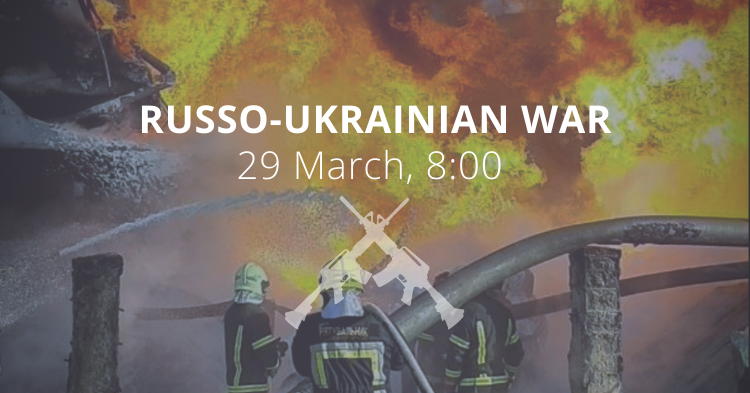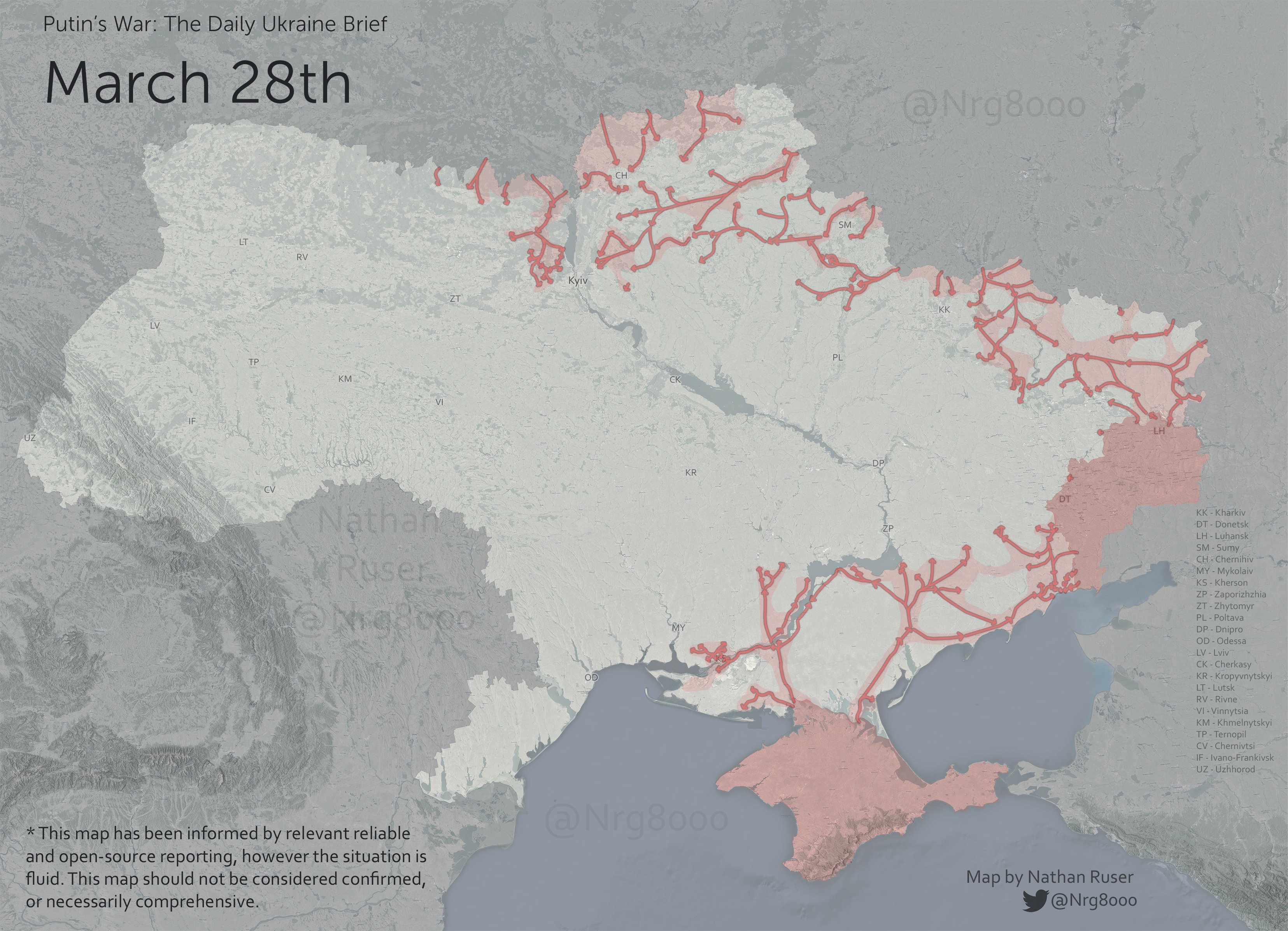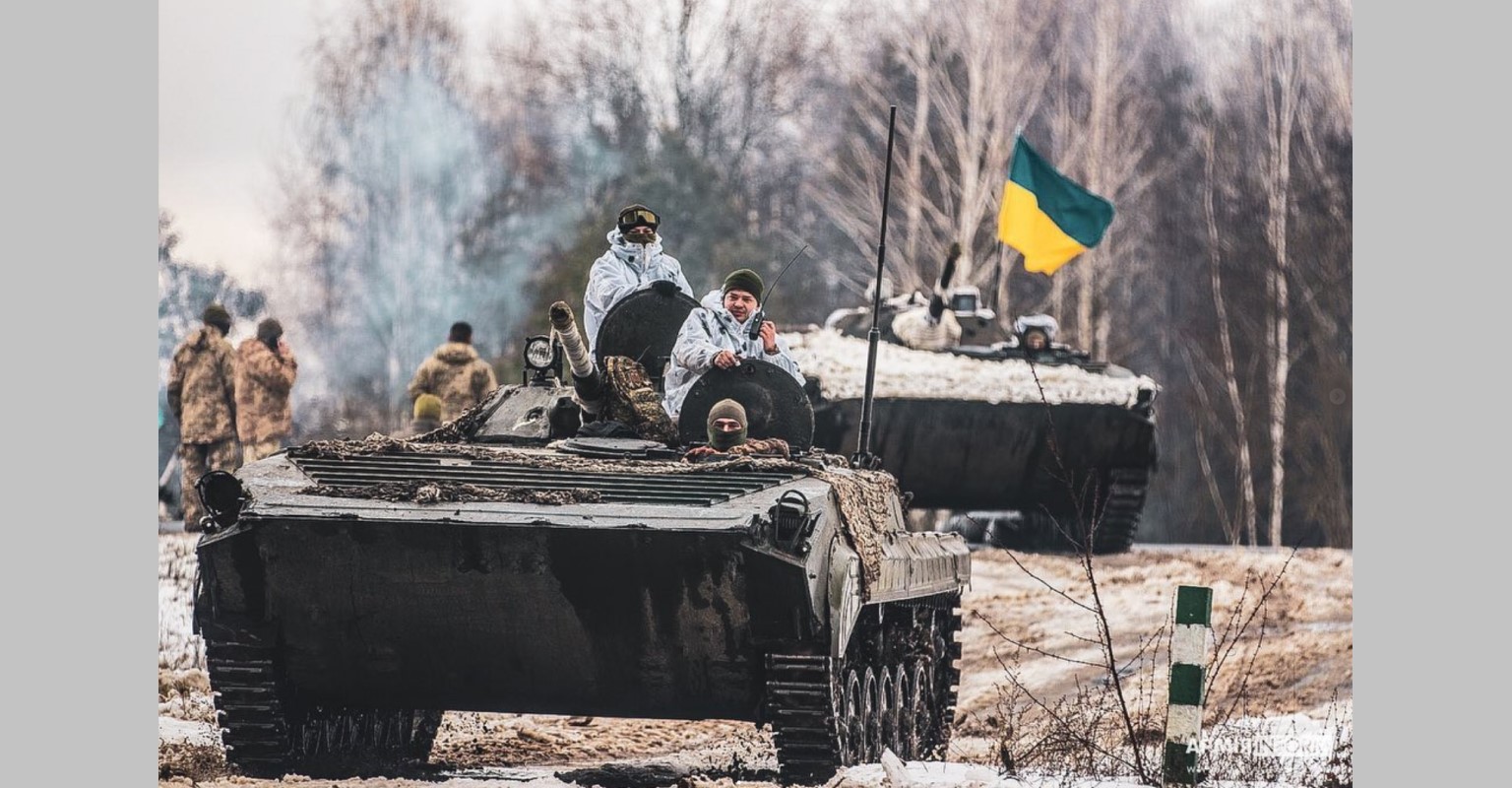Russia is trying to completely destroy the infrastructure and residential areas of Ukrainian cities; it targets fuel and oil storages in Ukraine and continues militarization of the Chornobyl Exclusion Zone. To conceal mass mobilization measures, Russia will hold it at the same time as the planned conscription. Having been preparing for peace (not war), NATO lacks critical capabilities.
The report is based on media reports, expert analyses, and official information posted online.
Situation
According to information from the General Staff as of 06.00 29.03.2022, supplemented by its [midnight assessment]:
- preventing the advance of the enemy in the directions of the settlements of Sloviansk and Barvinkove;
- taking of the settlements of Kamyanka, Topolske;
- creating conditions for improving the tactical situation in the area of the city of Chuhuiv;
- deterring enemy attacks in the areas of the settlements of Rubizhne, Lysychansk, Popasna, preventing the bypass of the main forces of the group.]
[At the same time, the Defence Forces of Ukraine continue to maintain the circular defence of the city of Mariupol and defend and deter the advance of the enemy in the Chernihiv Oblast.]
[To improve the operational situation and maintain the outer line of defence, the group defending Kyiv is continuing hostilities and controlling the situation in the settlements of Motyzhyn, Lisne, Kapitanivka and Dmytrivka.]
[Part of the Ukrainian forces continues to conduct a defence operation in other identified areas, a stabilization operation is being carried out, territorial defence tasks are being carried out and counterattacks are being carried out in certain areas.]
[The enemy is weakened, disoriented, much of it is cut off from logistics and the main forces.]
[The command of the Russian occupying forces is trying to compensate for the decline in the combat potential of the enemy's units by indiscriminate artillery fire and rocket-bomb attacks, thus destroying the infrastructure of Ukrainian cities.]
The [Ukrainian] Joint Forces of Ukraine repulsed 7 enemy attacks in the Donetsk and Luhansk directions during the day. Our soldiers destroyed 12 tanks, 10 infantry fighting vehicles and 3 units of motor vehicles. The enemy suffered casualties.
The Air Force of the Armed Forces of Ukraine yesterday hit 17 air targets - 8 planes, 3 helicopters, 4 UAVs of various types and 2 cruise missiles. Air Force aircraft fired missile and bomb strikes at places of accumulation of the Russian enemy equipment and manpower. The losses of the Russian occupiers are being clarified.“
Note: 34 days into the Russo-Ukrainian war, this report marks a substantial decrease in reporting on Russian and Belarusian activities by the General Staff of Ukraine, the significance which remains to be determined.
Covert mobilization continues in Russia, the Defence Intelligence of Ukraine (DIU) reports Monday 28 March.
From April 1, mobilization under the program "BARS-2021" (Combat Army Reserve of the Country) will start throughout Russia. To conceal mass mobilization measures, it will be held at the same time as the planned conscription. This will be a cover for a large number of mobilized people who will arrive at military enlistment offices. These reservists will be sent in the future to replenish the units of the occupying forces in the areas of hostilities on the territory of Ukraine.
The BARS program includes the involvement of Russian prisoners in hostilities. In particular, about 100 criminals detained in the Chernokozovo penal colony (Chechen Republic) are already preparing to be sent to Ukraine. All of them have been convicted of serious criminal offences. Convicts who have received terms under political articles (extremism, terrorism) are not offered such agreements. Those who agreed were promised a full amnesty in the event of a return alive after participating in hostilities.
"BARS" is a program of urgent formation of army reserves of the Russian army. During the year, reservists can be called to meetings (up to 1 month), where they can be involved in training and other tasks. The total number of people who signed BARS contracts is about 100,000.
On the 34th day of the Russo-Ukrainian war Irpin is liberated from the Russian occupiers, Ukrainska Pravda reports. The city is being cleaned up, residents are currently unable to return to their homes.
⚡️Irpin, Kyiv Oblast, has been fully liberated - the city's mayor
— Euromaidan Press (@EuromaidanPress) March 28, 2022
Sunday 27 March, the Ukrainian General Staff reported that according to available information, the Russian forces are increasingly using old and poor-quality ammunition. Thus, the 165th Artillery Brigade (Belogorsk), Amur Oblast, which is part of the Russian occupational group of forces, received permission to use such kind old and poor-quality munitions. This increases the risk of their detonation even when loading and transporting. The facts of such self-detonation of ammunition in Russian military depots and arsenals are well known and occur regularly.
A military diving team deactivated a stray naval mine off Türkiye's northwest coast on Monday, Türkiye's defence ministry said, the second such device to be defused in the area in days amid the Russo-Ukrainian war, Reuters reports. Russia's main intelligence agency last week accused Ukraine of laying mines to protect ports and said several hundred of the explosives had broken off from cables and drifted away. Kyiv dismissed that account as disinformation.
According to British Defence Intelligence, (last 24 hours):
- Ukrainian forces have continued to conduct localized counterattacks to the northwest of Kyiv - including at Irpin, Bucha and Hostomel. These attacks have had some success and the Russians have been pushed back from a number of positions. However, Russia still poses a significant threat to the city through its strike capability.
- Russian Forces have maintained their offensive on Mariupol with continuous heavy shelling of the city, however, the center of the city remains under Ukrainian control.
- Elsewhere, Russian Forces are maintaining blocking positions while attempting to reorganize and reset their forces.
- Russian Private Military Company the Wagner Group has deployed to eastern Ukraine.
- They are expected to deploy more than 1,000 mercenaries, including senior leaders of the organization, to undertake combat operations.
- Due to heavy losses and a largely stalled invasion, Russia has highly likely been forced to reprioritize Wagner personnel for Ukraine at the expense of operations in Africa and Syria.
As of Tuesday 29.03.2022, the approximate losses of weapons and military equipment of the Russian Armed Forces from the beginning of the Russo-Ukrainian war to the present day:
- personnel – more than 17,200 people (+200),
- tanks – 597 units (+13),
- armored combat vehicles – 1710 units (+16),
- artillery systems – 303 (+1),
- multiple rocket launchers – 96 (+1)
- air defense means – 54 (no change),
- aircraft - 127 (+4),
- helicopters - 129 (+2),
- automotive technology – 1178 (+28),
- vessels/boats - 7 units (no change),
- fuel and lubricant tanks – 73 (no change),
- UAV operational and tactical level – 71 (+5)
- Special equipment – 21 (no change)
- Mobile SRBM system – 4 (no change)
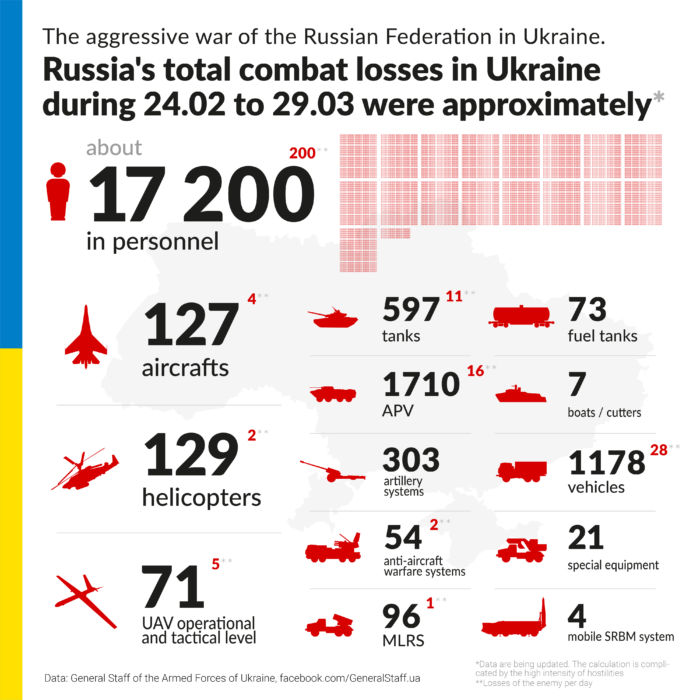
Humanitarian
According to UNHCR 3,866,224 refugees have been registered as of 27 March 12 CET. The UN says that so far Poland has taken in 2,293,833 refugees, Romania 595,868, the Republic of Moldova 383,627, Hungary 354,041, Slovakia 275,439, Russian Federation 271,254 (no changes since recent evaluation), and Belarus 9,075.
OHCHR recorded 2,975 civilian casualties in Ukraine: 1,151 killed (103 children), and 1,824 injured (133 children) as of midnight on 27 March. Office of the Prosecutor General of Ukraine reports that as of 8 a.m. on March 29, 144 children were killed and more than 220 children - injured. The numbers are most likely far higher.
Nearly 5,000 people, including about 210 children, have been killed in the southern Ukrainian city of Mariupol since Russian forces laid siege to it, a spokesperson for the mayor said on Monday, Reuters reports. “Boichenko's office said 90% of Mariupol's buildings had been damaged and 40% destroyed, including hospitals, schools, kindergartens and factories. About 140,000 people had fled the city on the Sea of Azov before the Russian siege began and 150,000 have exited since then, leaving 170,000 still there, according to its figures, which Reuters could not immediately verify.”
Due to intelligence reports indicating possible provocations prepared by Russian troops against agreed humanitarian corridors, there was no evacuation effort done on March 28 due to security considerations, Deputy Prime Minister - Minister of Reintegration of Temporarily Occupied Territories of Ukraine stated.
Environmental
Sunday 27 March, the Ukrainian General Staff reported:
The militarization of the Chornobyl Exclusion Zone by the Russian occupation forces continues. This militarization seriously increases the risk of damage to the insulation structures built over the station's fourth power unit after its 1986 explosion. Such damage will inevitably lead to a significant amount of radioactive dust entering the atmosphere and contaminating not only Ukraine but also other European countries. The occupying forces of the Russian Federation ignore threats and warnings and continue to transport and store a significant amount of ammunition near the Chornobyl Nuclear Power Plant.
Dozens of tons of self-propelled rockets, howitzers artillery shells, and mortar ammunition are transported daily by the units of the Eastern Military District of the Armed Forces of the Russian Federation from the logistics rear base located in the Naraulianski Rajon (District) of the Gomel Region of Belarus. The transport corridor of the Russian invaders passes through the city of Prypiat a few hundred meters from the isolation facilities of the Chornobyl Nuclear Power Plant. Further ammunition is stored in the city of Chornobyl, near the city of Pripyat, which is also a short distance from the Chornobyl Nuclear Power Plant. In the city of Chornobyl, the occupiers deployed a temporary Command post of the Eastern Military District, as well as a Command post of the 38th Separate Motorized Rifle Brigade of the Land Forces of the Armed Forces of the Russian federation.
State Emergency Service of Ukraine reports on ongoing work to tackle the fire on oil and gas storages in the western Oblasts of Ukraine (Lutsk and Rivne). Damages happened on March 27 and 28 as a result of targeted Russian forces shelling and bombing the mentioned objects. These events cause a high level of pollution in the entire region.
https://twitter.com/EuromaidanPress/status/1508484017196355590
Due to the spread of false information on social networks and in a number of media outlets about large-scale fires in the Chornobyl Exclusion Zone and compulsory resettlement, the State Emergency Service of Ukraine reports: as of 7:57 am on March 28, according to satellite images of heat emissions and their capacities, there are no fires and fires in the Exclusion Zone and mandatory resettlement.
The buildings and infrastructure of the NSI “Neutron Source” were severely damaged because of shelling by Russian troops at about 14:00 on 28 March 2022. NSI “Neutron Source” is a nuclear subcritical installation situated in the National Science Center of Kharkiv Institute of Physics and Technology. “At the moment, it is not possible to estimate in detail the extent of the damage due to the hostilities.] SNRIU warns that [NSI “Neutron Source”, as well as any other nuclear installation, is not designed for operation in conditions of combat operations. Continuation of bombing and/or shelling can lead to severe radiation consequences and contamination of the surrounding territories.”
Legal
According to the General Staff of Ukraine:
- The Russian enemy continues to insidiously launch missile and bomb strikes, trying to completely destroy the infrastructure and residential areas of Ukrainian cities. It concentrates on fuel storage, in order to complicate logistics and create conditions for a humanitarian crisis.
- In violation of the requirements of International Humanitarian Law in some temporarily occupied settlements of Kyiv, Zaporizhzhia, Chernihiv, Kherson and Kharkiv oblasts, the Russian occupiers continue to terrorize the local population. They are shelling residential buildings; robbing, abducting and taking civilians hostage.
More than 60 Ukrainian churches and religious buildings were destroyed by the Russian army during the month of the full-scale Russo-Ukrainian war, the Hybrid Warfare Analytical Group reports. “Russians destroy two spiritual buildings every day. Churches were destroyed in at least 8 Oblasts of Ukraine.”
Overall registered numbers of crimes: 3236 crimes of aggression and war crimes, and 1885 crimes against national security.
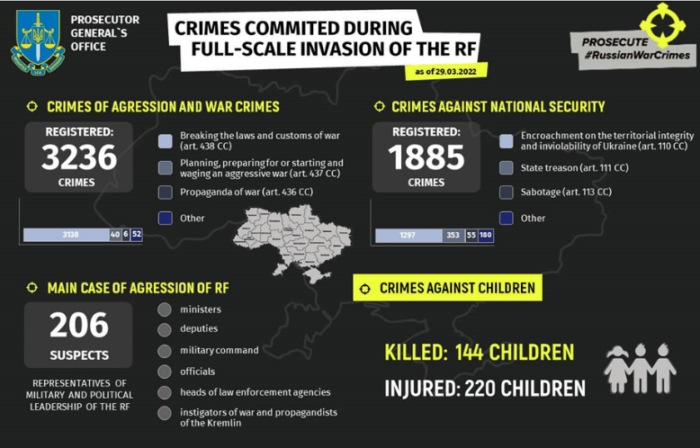
Around 40 000 Ukrainian citizens were forcefully evacuated to Russia by its defense forces as of March 26, the Government of Ukraine reports.
A list of 620 Russian Federal Security Service (FSB) officers operating in Europe, has been released by the Defense Intelligence of Ukraine (DIU).
March 28 is the deadline for Russian airlines to return more than 400 leased aircraft worth nearly $ 10 billion, Reuters reports.
“Dual registration is not allowed under international rules, but Russia has already moved more than half of the foreign-owned aircraft to its own registry after passing a law permitting this, Russia’s government said on Wednesday. “I’m afraid that we are going to witness the largest sort of theft of aircraft in the history of commercial civil aviation,” said Volodymyr Bilotkach, an associate professor of air transport management at the Singapore Institute of Technology.”
Support
Zelensky says Ukraine will create a group to analyze the effectiveness of sanctions, The New York Times reports. In his nightly address on Monday, President Volodymyr Zelensky of Ukraine said that his office will create a group of experts this week to analyze the effectiveness of sanctions against Russia, which he has said do not go far enough.
Zelensky said there are many “hints and warnings” that sanctions against Russia will be tightened, especially if Russia uses chemical weapons in its attacks against Ukraine.
“Just think about what it all came down to: Waiting for chemical weapons, Mr Zelensky said. “We, living people, have to wait. Doesn’t everything that the Russian military is doing and has already done deserves an oil embargo?”
"No one has the right to use the lives of Ukrainians to save some income in or with Russia...Weak sanctions create a dangerous illusion for the Russian leadership that they can continue. And the price for this is paid by thousands of lives," Zelenskyy said https://t.co/EUcH1F0pk8
— Euromaidan Press (@EuromaidanPress) March 28, 2022
In a post on Twitter on Monday, Lesia Vasylenko, a member of Ukraine’s Parliament, noted that members of the Group of 7 rejected a demand by President Putin to pay for Russian gas and oil in rubles, but added that Ukraine would have preferred that the G7 rejected the purchase of Russian oil and gas completely.”
Note: According to the Centre for Research on Energy and Clean Air (CREA) the EU has as off today sent €20.8 billion to Putin by importing Russian gas, oil and coal since the start of the invasion.
EU countries look to share efforts of hosting Ukrainian refugees, Reuters reports. Germany called on Monday for a more even distribution of Ukrainian refugees in the European Union, after some 3.8 million people fled Russia’s war.
“Since Russia invaded its neighbour on Feb. 24 the fighting has displaced more than 10 million people and forced nearly 4 million to flee Ukraine in Europe's biggest refugee crisis since the end of World War Two, according to the UN refugee agency.”
Secretary of State Antony Blinken to press Middle East allies for stronger support for Ukraine, The New York Times reports. The countries (Israel, the U.A.E., Bahrain and Morocco) have provided some modest backing, but Blinken will ask for more.
New developments
- Negotiations between Ukraine and Russia will take place in Istanbul on 29 March, Ukrainska Pravda reports. Turkish President Recep Tayyip Erdogan said a few days ago that Ukraine was ready to accept four of Russia's six demands, including renouncing NATO membership and recognizing Russian as the second state language. This was denied by Foreign Minister Kuleba, stressing that there was no consensus with Russia on the four points of the talks mentioned by the Turkish president. The news outlet points out that “President Erdogan has repeatedly stated that he would like to mediate in the talks between the Presidents of Ukraine and Russia. At the same time, the Turkish side often repeats the Kremlin's narratives. Türkiye, despite NATO membership, is trying to maintain a partnership with Russia to balance security interests in the Black Sea and the Caucasus, primarily because of the Nagorno-Karabakh conflict.”
- Russian President Putin does not appear ready to make compromises to end the Russo-Ukrainian war, Reuters reports, citing a senior US official. Ukrainian officials also played down the chances of a breakthrough at the talks.
- The OPEC+ alliance of oil producers' mission is to maintain a balanced market, Reuters reports, citing the United Arab Emirates energy minister. “Earlier on Monday, several sources close to OPEC+ told Reuters the group would likely stick to its plans for a modest increase in its oil output in May, despite a surge in prices due to the Ukraine crisis and calls from consumers for more supply.”
- The UN General Assembly is expected to vote Thursday on a resolution that would demand that Russia stop the Russo-Ukrainian war "immediately", DW reports. Ukraine put the new resolution forward at a UN General Assembly emergency session on Wednesday. “The text, which is also non-binding, demands an immediate cessation of the hostilities by the Russian Federation against Ukraine, in particular of any attacks against civilians and civilian objects."
https://twitter.com/EuromaidanPress/status/1508546240128110601
Assessment
On the War
The Institute for the Study of War has made the following assessment as of Monday 28 March:
Key Takeaways
- Russian forces have not abandoned their objective to encircle and capture Kyiv, despite Kremlin claims that Russian forces will concentrate on eastern Ukraine.
- Ukrainian forces recaptured the Kyiv suburb of Irpin on March 28. Ukrainian forces will likely seek to take advantage of ongoing Russian force rotations to retake further territory northwest of Kyiv in the coming days.
- Russian forces conducted unsuccessful attacks toward Brovary and did not conduct offensive operations toward Chernihiv, Sumy, and Kharkiv. Russian operations in northeastern Ukraine remain stalled.
- The Ukrainian General Staff stated that a battalion tactical group (BTG) of the 1st Guards Tank Army fully withdrew from Ukrainian territory near Sumy back to Russia for possible redeployment – the first Ukrainian report of a Russian unit fully withdrawing into Russia for redeployment to another axis of advance in this conflict.
- Russian forces continued to steadily take territory in Mariupol.
- Ukrainian resistance around Kherson continues to tie down Russian forces in the area. Russian forces did not conduct any offensive operations in the southern direction.”
https://twitter.com/EuromaidanPress/status/1508204716731236354
In an interview with “Coffee or Die” on Sunday 27 March, by Howard Altman, the Head of the Defence Intelligence of Ukraine (DIU), Brigadier General Kyrylo Budanov expressed a lack of surprise by the fact that Russia is making little headway in its all-out assault on his nation.
Ukraine has managed to penetrate many layers of Russia’s military, political, and financial sectors, using the information to its great advantage. Ukraine has spies across Russia’s military and political landscape, including in Putin’s administration, he claimed. Additionally, human intelligence has been augmented by Ukraine’s rapidly increasing cyber intelligence capabilities, which offer a deep view into both Russian military plans and the country’s political and economic sectors. Ukraine sees Russian troop communications, he claims. “Among many other things, those surreptitious insights allowed Ukraine to know back in November how and when Russia was planning to attack.”
Ukraine’s intelligence coups, he added, have also allowed them to cull the ranks of Russian generals in Ukraine, a toll which now stands at seven.
Among them, Budanov said, are those who answered Zelenskyy’s call for foreign fighters, as well as indigenous guerrilla fighters conducting irregular and the unconventional war on Russian troops. Both efforts, he said, are under the control of his directorate. […]
Their first employment was in Moshun, a small village north of Kyiv, he said. “It was the hardest spot for much of the period of time during this war,” Budanov said. “Then we deployed them in Irpin, near Kyiv. As you can see, Moshun is completely liberated and Irpin is almost liberated. We can see that the experience of their employment is quite positive and successful.”
MIGs, and what it will take
Ukraine’s current successes have inspired a global following. I asked Budanov to give me a candid assessment of how long he really thinks Ukraine can hold out, given the overwhelming resources Russia still has left, and Ukraine’s current troop levels and armaments, which are being greatly augmented by a flow of smaller weapons like the man-portable anti-armour Javelin, Stinger anti-aircraft systems, Switchblade drones, and other items like those included in the most recent $800 million aid package ordered by US President Joe Biden.
His answer was both stoic and realistic. “We stand and we can stand as long as possible and we are ready for that,” he told me. “We will liberate the whole of Ukraine and also the temporarily occupied territories.” But not without more help, he said.
“First of all, we need the armament support,” Budanov said. “We need serious armaments, not small arms. We need combat aviation, not the fourth generation. We need very serious air defence systems and anti-missile systems and artillery systems of 155 mm or larger. That is our main request. That’s what we need most. If you were held to small arms and light armaments, we won’t be able to solve any problems in this war.”
Without that equipment, he told me, “it won’t stop the progression of Russia.” Budanov was particularly keen on so-called “fifth-generation” fighter aircraft.”
Consequences and what to do?
Moscow broke all rules of international order by using force to shift borders and it will be Russia that will most severely suffer the consequences of this, German Chancellor Olaf Scholz said on Monday, Reuters reports. The need to guarantee security in Europe is one of the core insights of the post-war period that everyone including Russia agreed on after 1990, Scholz said in a news conference after meeting Swedish Prime Minister Magdalena Andersson.
"There can only be one answer to that. First, we call on Russia to stop the war. Second, we make ourselves so strong that an attack on EU or NATO countries does not take place because we are strong enough to answer that," Scholz said.
The statement reflects the recent decision made at the NATO summit where the member countries agreed to redouble efforts to meet the Defence Investment Pledge made 8 years ago (and still not met).
“Allies will submit additional plans on how to meet the pledge in time for the Madrid Summit in June. And I welcome that a number of Allies today announced plans for significant increases in defence spending”, NATO Secretary-General said at the press conference.
Both statements might help explain why more substantial support to Ukraine is not forthcoming. Both statements reflect an aspiration to build a capacity NATO should have had on 24 February but hope to have in the future.
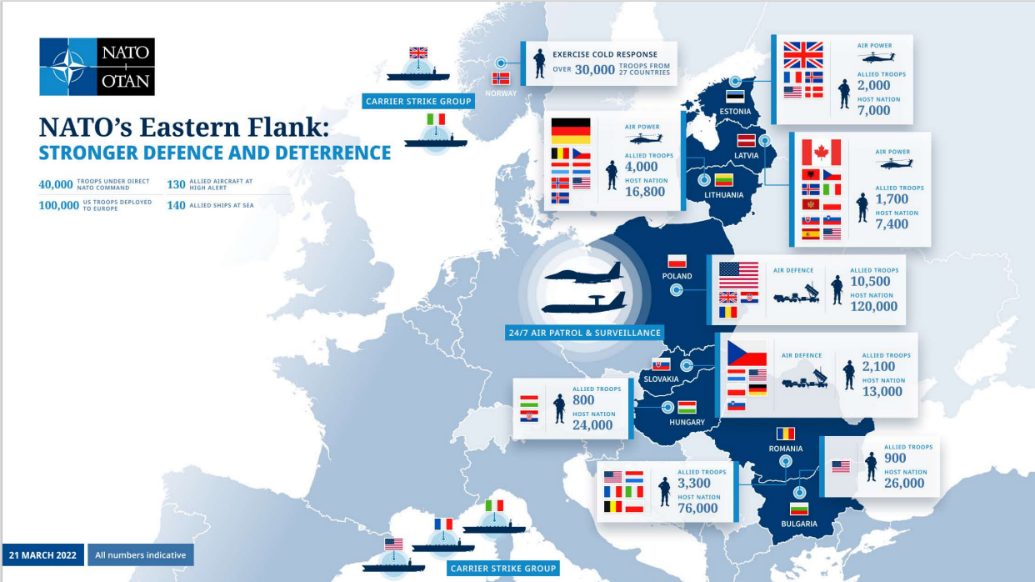 At the Wales summit in 2014, the NATO members decided on an ambition – not a binding pledge – to halt any decline in defence expenditure; aim to increase defence expenditure in real terms as GDP grows; aim to move towards the 2% guideline within a decade to meet their NATO Capability Targets and fill NATO's capability shortfalls.
At the Wales summit in 2014, the NATO members decided on an ambition – not a binding pledge – to halt any decline in defence expenditure; aim to increase defence expenditure in real terms as GDP grows; aim to move towards the 2% guideline within a decade to meet their NATO Capability Targets and fill NATO's capability shortfalls.
8 years later, only 10 out of 30 countries have met the declared goal of 2% defence expenditure as a share of GDP and 20% equipment expenditure as a share of defence expenditure. 5 out of 30 meet neither of the two requirements (Belgium, Canada, Germany, Portugal, and Slovenia).
The consequences of underfunding the Armed Forces were clearly demonstrated in Ukraine in 2014. In the article “Is Ukraine’s reformed military ready to repel a new Russian invasion?“ by the Centre for Defence Strategies, we highlight the fact that “Even though the [Ukrainian] military has been prioritized for the last seven years, it has been impossible to overcome decades of neglect. The [Ukrainian Armed Forces] therefore still has several enduring strategic vulnerabilities. Funding is limited due to the general economic conditions of the country. Ukraine has been forced to down-prioritize many important acquisitions, not for lack of will, but due to a desperate lack of funding.”
Russia has recently made exactly the same experience – not for lack of funding – but the theft of it.
NATO has yet to make the Ukrainian and Russian experience. Having prepared for peace (not war), the Alliance lacks critical capabilities. Its logistic stockpiles are most likely, depleted after decades of neglect.
“You go to war with the army you have, not the army you might want or wish to have at a later time.”
Or as we do at this moment in history: We don’t fight. Not for European security as laid down in NATO strategic concept. And not for the core values and principles such as individual liberty, democracy, human rights and the rule of law, we have committed to protecting. We watch.

